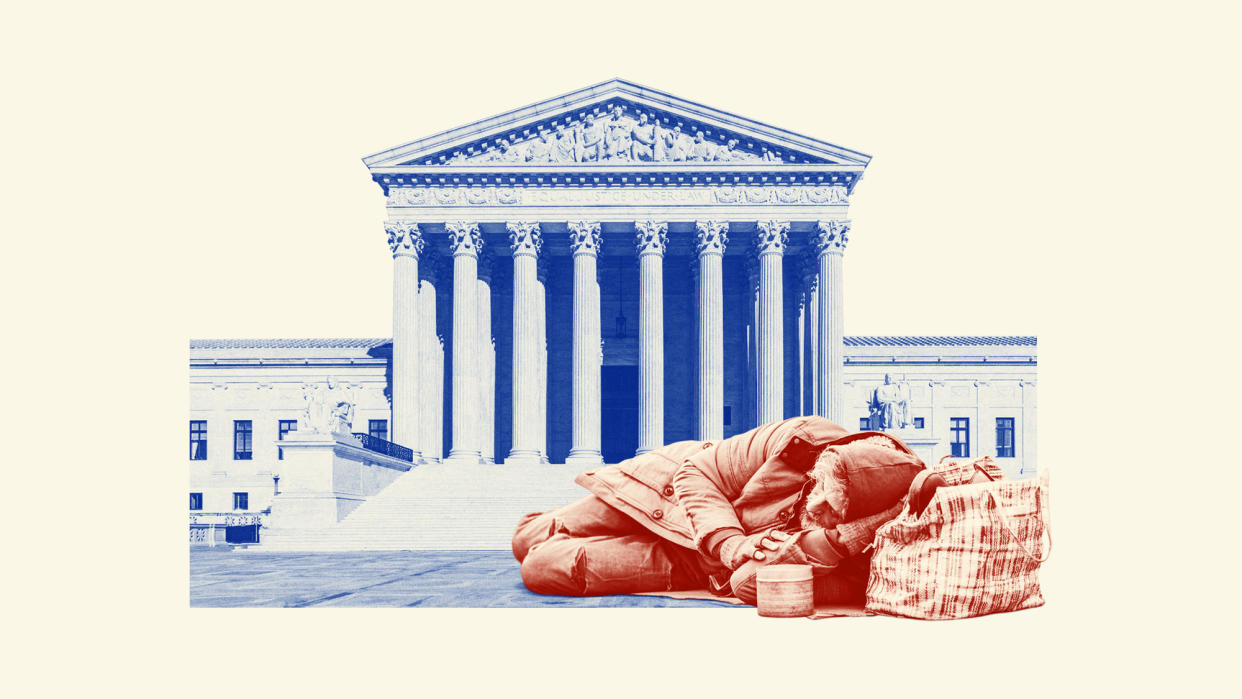Is the Supreme Court about to criminalize homelessness?

Can homeless people be punished for sleeping outside? The Supreme Court is about to decide. The court will soon hear a case to determine whether towns and municipalities "can fine or jail people for camping in public," The Associated Press said. The case arrives before justices at a critical moment: The federal government reported in December that homelessness has surged to its "highest reported level" — nearly 600,000 people across the country — driven by a lack of affordable housing and the end of pandemic-era housing assistance.
Federal courts have previously ruled that the Constitution's Eighth Amendment, which bars cruel and unusual punishment, "forbids criminalizing sleeping in public" if a person has no other place to lay their head, University of Southern California Law Professor Clare Pastore said at The Conversation. Now the city of Grants Pass, Oregon, is challenging that precedent, arguing the Eighth Amendment "forbids only certain cruel methods of punishment," not fines or jail terms. The Supreme Court's decision, Pastore said, will "affect the health and welfare of thousands of people experiencing homelessness."
Homelessness is becoming more visible in the United States, Stateline said. The result? A growing friction in communities that have pivoted "from a focus on the rights of homeless people to the rights of local residents and businesses" affected by encampments. Justices will decide whose rights matter more.
The Supreme Court can make a difference
Homeless people in Grants Pass are "being punished for the unavoidable human need to sleep," said the ACLU's Scout Katovich. But this isn't just an Oregon issue: "We've seen a troubling uptick" in sleeping and camping bans across the country — even though there aren't nearly enough shelters and beds to give every single homeless person a safe place to rest. "If the Supreme Court rules for Grants Pass, cities could be empowered to treat all of those people as 'criminals.'"
"Obviously homelessness is a distressing, often tragic problem," said Goldwater Institute's Timothy Sandefur. But those problems are driven to a large extent by addiction and mental illness, and "neither of these have ever been viewed as exempting people from the law." In truth, the legal precedent against criminalizing homelessness has only made the problem worse by "confusing and frustrating city officials who want to do something to clean up their communities and help the unsheltered." Instead, forcing cities to allow camping gives them "handy excuses to do nothing about the homelessness problem."
The Supreme Court ruling may have effects beyond the issue of homelessness. A reconsideration of the Eighth Amendment's ban on cruel and unusual punishment "could have ramifications across a wide swath of the criminal justice system," said The Marshall Project. It could limit prisoner rights while making death penalty executions more frequent, depending on how sweeping a ruling the justices decide to issue in the Grants Pass case.
It's bigger than one case
No matter the Supreme Court's ruling, "governments will still be in search of an actual solution" for homelessness, Mandy Chapman Semple and Nathaniel Fields said at Next City. Cities like New Orleans and Houston have come up with successful approaches that move people to housing by "focusing on one encampment at a time." There doesn't have to be a conflict between the needs of homeless people and public safety. "We do not have to choose one over the other."
Whatever the court decides to rule, "criminalizing homelessness won't make it go away," Mark Horvath, Adam Westbrook and Lindsay Crouse said at The New York Times. There are many causes of homelessness, including addiction and mental illness. "Some have made unwise choices, and some are simply unlucky." But a few people simply cannot easily afford shelter: 70% of "extremely low income" Americans pay more than half their income on rent. "Becoming homeless is easier than we'd like to think." The Supreme Court will hear the Grants Pass case on April 22.

